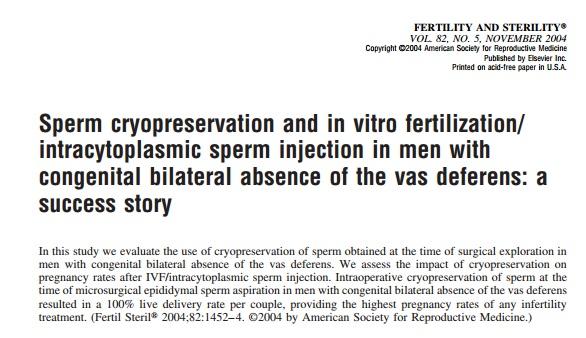Congenital bilateral absence of vas deferens (CBAVD)is diagnosed in 1.3 % of the men referred for infertility evaluation. Moreover, CBAVD accounts for 27% of the men with primary obstructive azoospermia. An almost equal number of men with other causes of surgically unreconstructable obstructive azoospermia are referred for evaluation.
In the past decade, the techniques of epididymal sperm retrieval and micromanipulation to assist fertilization have been two of the most exciting developments in the field of male infertility treatment. Men with congenital bilateral absence of the vas defences (CBAVD), or acquired reproductive tract obstruction are now able to achieve pregnancies with use of these advanced techniques. We have found that microsurgical epididymal sperm aspiration (MESA) using a glass micropipet technique simultaneous to intracytoplasmic sperm injection (ICSI) appears to maximize opportunities of pregnancy for these infertile couples with unreconstructable male reproductive tract obstruction. MESA from individual epididymal tubules with a micropuncture technique allows retrieval of high numbers of sperm with optimal quality for immediate use during ICSI as well as for cryopreservation. A unique micropuncture pipet holding apparatus, MESA- Holder has been developed at Cornell. Its unique 180° angle adjustable pipet holding system simplifies the procedure of micropuncture epididymal sperm retrieval. The micropuncture technique is an atraumatic technique that limits damage to the epididymal tubules and avoids potential blood cell contamination of the epididymal fluid, while yielding high quantities of motile spermatozoa.

Experience with the last 59 couples with obstructive azoospermia who selected to undergo MESA-ICSI at Cornell from April, 1995 to June, 1996 is presented. Sperm was retrieved from the epididymis in 59/59 (100%) attempts, despite multiple aliquots of previous unsuccessful sperm retrieval attempts at other institutions. In all 59 cases motile sperm were cryopreserved as well. Clinical pregnancies were achieved in 80%( 47/59) cycles for these couples. Ongoing pregnancies or deliveries have occurred for in 68% (40/59) cycles of simultaneous MESA-ICSI. .
Simultaneous MESA-ICSI appears to provide optimal pregnancy and delivery rates for couples where the man has unreconstructable reproductive tract obstruction.

